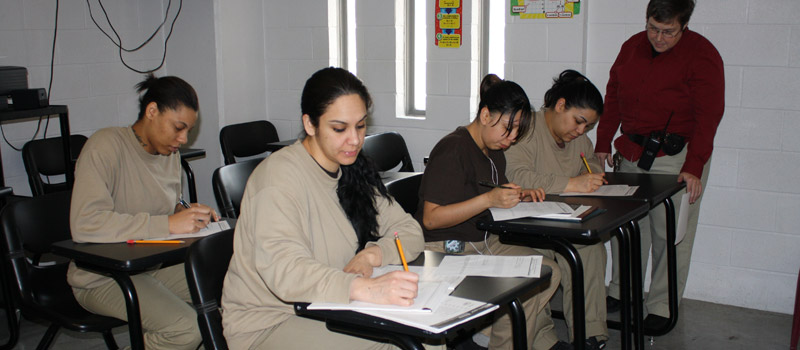Female Offenders
Female offenders are provided appropriate programs and services to meet their physical, social, and psychological needs

Of the nearly 152,000 federal offenders, women consistently account for approximately 7 percent of the federal inmate population. While nationwide, women are a growing correctional population, women in the Bureau have comprised a steady proportion of the overall population. In the Bureau, women are housed among 29 facilities.
Because the Bureau recognizes women may have different needs than men, the Reentry Services Division includes a Women and Special Populations Branch (WASPB). This office ensures the development and provision of services to meet the needs of federally incarcerated women, and provides national guidance on the classification, management, intervention programs and practices for females in Bureau custody. Stakeholder engagement, including inmate feedback, is a priority, and is utilized to identify and implement new programmatic and training needs. As the agency's primary source for subject matter expertise on women, WASPB is involved in national policy development, ensuring new initiatives address sex-specific needs.
Programs and Services
Women in Bureau custody are offered many of the same educational and treatment programs that are available to male offenders; however, women in prison differ from their male counterparts in significant ways. For example, women are more likely to be primary caregivers for children, experience economic hardship, employment instability, and have fewer vocational skills as compared with males. They are more likely than men have a history of trauma and abuse, which poses additional challenges for reentry. Therefore, specialized initiatives and programs are offered at female sites which are trauma-informed and address women's specific sex-based needs.
In meeting the sex specific needs of women, the Bureau has greatly increased the programming and services which are available to women. These initiatives include additions to the First Step Act (FSA) required Evidence Based Recidivism Reduction (EBRR) Programs and Productive Activities (PAs) available for women. The agency provides more than 15 programs specifically for women. We recently added college programming for women as well. More information on EBBR Programs and PAs can be found in the First Step Act Approved Programs Guide.
The Bureau's flagship women's program is the Foundation Program, which assists women in assessing their individual needs and translating the results of that assessment into the selection of programs and plans to meet their goals. It is offered at all female sites. The FIT Program (Female Integrated Treatment Program) is a residential treatment program that offers integrated cognitive-behavioral treatment for substance use disorders, mental illness, and trauma related disorders, as well as vocational training, to female inmates. The Resolve Program which is a non-residential trauma treatment EBRR program for women has also been expanded to all female facilities housing designed women. Additionally, the EBRR National Parenting Program includes sex specific modules added for women.
The Bureau also provides a wide range of PAs for women that address sex specific needs including domestic violence survival, aging, pro-social and assertive communication skills, emotional regulation, relationships, job and work force skills, and criminal thinking.
Pregnancy Issues
Women in prison are often the primary or sole caregivers of children prior to incarceration. For offenders who will give birth during their incarceration, there are two programs offered to assist these mothers before, during, and after childbirth; these include Mothers and Infants Together (MINT) and the Residential Parenting Program (RPP). The MINT Program is a community residential program that aims to assist offenders during the last two months of pregnancy. Eligible inmates are transferred to a Residential Reentry Center and remain there for up to three months after birth to bond with their children before returning to the institution to complete their sentence. Inmates may be permitted to stay longer. MINT locations include Phoenix, AZ; Tallahassee, FL; Springfield, IL; Fort Worth, TX; and Hillsboro, WV. RPP is offered to pregnant inmates through the Washington Department of Corrections (WADOC). RPP allows minimum security inmates with a sentence of less than 30 months the opportunity to reside with their babies after birth in a supervised environment for up to 30 months. During this time, the mothers also receive a variety of services such a mental health, medical care, vocational training, and child care.
The Bureau shall offer to provide each pregnant inmate with medical, religious, and social counseling to aid in making the decision whether to carry a pregnancy to full term or to have an elective abortion.
Policy
The Program Statement, Female Offender Manual , is the agency's primary policy addressing the management of incarcerated women. The agency also issued an Operations Memorandum requiring all female sites provide five types of feminine hygiene products to inmates free-of-charge.